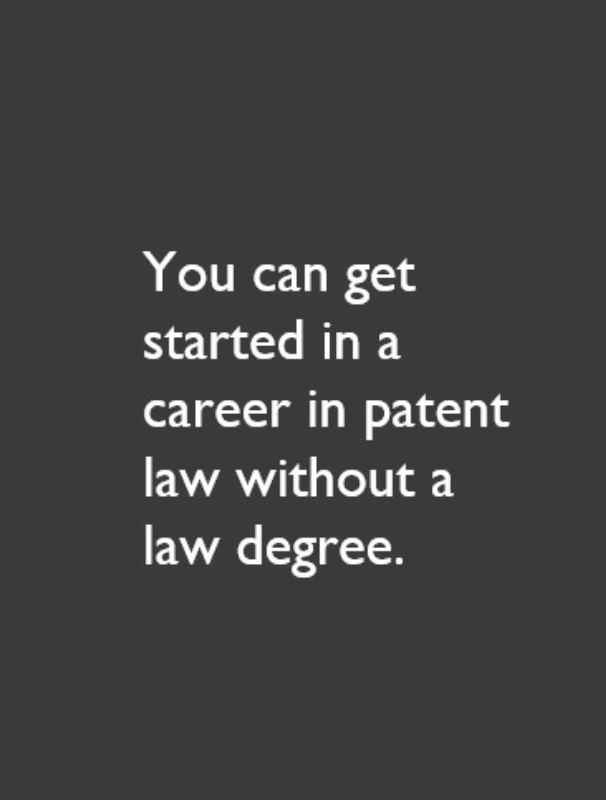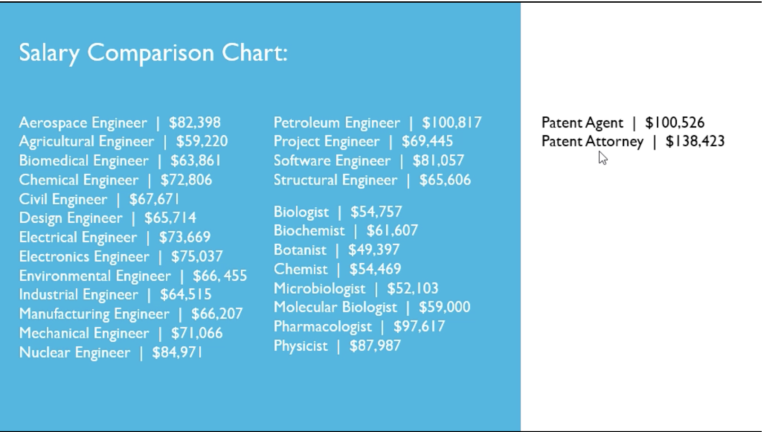About Patent Law
Patent Law is one branch of Intellectual Property (IP) Law. IP Law is law protecting and fighting over the rights to ideas. For example, trademarked, copyrighted, or patented material. While IP Law broadly can cover a wide variety of content such as music and art and does not always require a specific background, Patent Law aims to protect a scientific process or product, and therefore requires experience in science or engineering.
A patent is an exclusive right granted for an invention that provides, in general, a new way of doing something, or offers a new technical solution to a problem. To get a patent, technical information about the invention must be disclosed to the public in a patent application. That is where a patent agent or attorney comes in.
You can have a patent law career with or without a law degree (J.D.)! Your options are:
- Patent Agent (no J.D. required)
- Patent Attorney (has J.D.)

Patent Agents v. Patent Attorneys
Both Patent Agents and Attorneys may write patent applications and submit them to the US Patent and Trademark Office (USPTO). However, if there is a dispute about a patent only Patent Attorneys may litigate patents in a court of law or advise clients in legal matters.
Both Patent Agents and Attorneys must either have a degree (B.S., B.A., Masters or PhD) in science or engineering, or have taken a certain amount of science and/or engineering classes to qualify to sit for an exam called the Patent Bar.
The Patent Bar
Different from what attorneys normally refer to as “The Bar Exam”, the Patent Bar is an exam an individual must take to become a Patent Attorney or Patent Agent. It is also known as the patent bar exam or patent exam. By passing this exam, these professionals can represent inventors in front of the United States Trademark and Patent Office (USPTO). Unlike traditional bar exams, applicants do not need a legal background.
Patent Bar Info
Pursuing Patent Law
- Get a degree in science or engineering, or take the required amount of approved courses. (See full list of requirements here)
- Decide whether you’d like to be a Patent Agent or Patent Attorney.
- You can also work as a Patent Agent while you decide whether to become a Patent Attorney and invest in law school.
- If you would like to become a Patent Agent before/in lieu of attending law school, study for and pass the Patent Bar Exam.
- If you decide to go to law school first, apply for a Juris Doctor (J.D.) program at a law school. Graduate from law school and become licensed in the state(s) in which you plan to practice. This usually means taking the Bar Exam that is accepted in that jurisdiction.
- If you graduate from a Wisconsin law school and plan to practice law in the state of Wisconsin, you can use Diploma Privilege to skip taking the Bar Exam to become a licensed attorney in Wisconsin. In addition to taking a bar exam or using diploma privilege to become a licensed attorney, you must also pass the Patent Bar if you have not already done so.
Salary
Patent Law is seen as one of the more in demand legal careers. In general, Patent Agents tend to make more than most other science and engineering careers. Patent Attorneys usually make more money than Patent Agents. The Salary Comparison Chart below was provided by the US Patent & Trademark Office (USPTO).

Patent Practitioners in High Demand
According to the Patent Bar Education Series, electrical and mechanical engineers are in the highest demand. Life sciences degrees like biochemistry and molecular biology are also in demand although these typically require higher degree levels (like a Master’s degree or Ph.D.). Realistically, any major on the list of requirements from the USPTO will work. There is no one best degree or background.
It helps to have a background in an area where there are a lot of advancements being made or one where there are few people with the right background. Those are the fields where people are needed to help with patent inventions.
If you’re in a niche or specialized field, the best thing to do is to research job postings and talk to lawyers/patent agents in the field to find out what employers are looking for to hire in that field. Determine if firms or companies are hiring that type of patent practitioner in a specific location you’re interested in. That will give you an idea as to whether or not you can gain employment easily in this particular field or if it will be more difficult. You can decide from there whether this is the right move for you to make.
Citizenship
You must be a U.S. citizen who resides in the U.S in order to qualify as a registered patent agent or patent attorney. While aliens residing in the U.S. may apply to sit for the patent bar, “qualifying documentation should specifically show that the immigration authorities have authorized the applicant to be employed or trained in the capacity of representing patent applicants before the USPTO by preparing and prosecuting their patent applications”. Even then, you would not be a registered patent agent or attorney, but classified as having “limited recognition”.
Please check the official bulletin published by the USPTO for further details. (See “Eligibility of Aliens” starting on page 11)